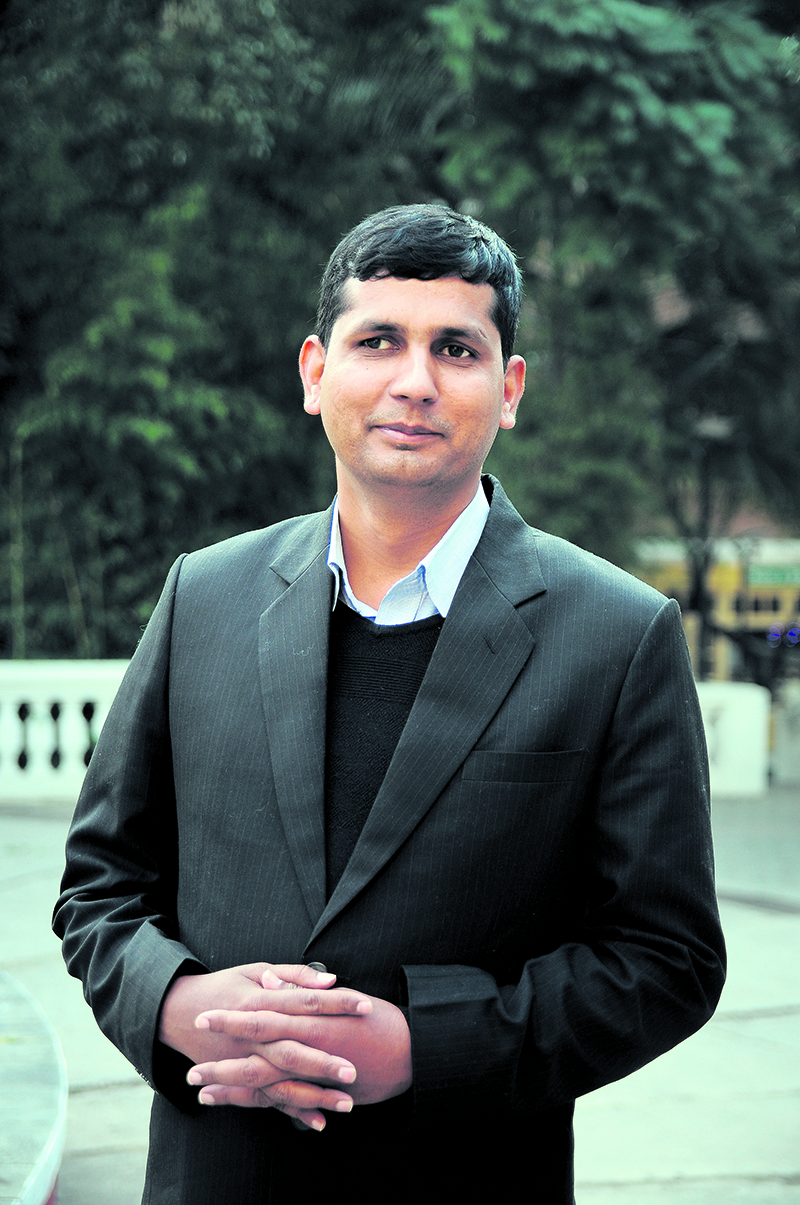
OR
For an inclusive society
Published On: December 8, 2017 07:57 AM NPT

“As blind and partially sighted students, my friends and I faced numerous difficulties in classrooms and exam halls throughout our school life,” says Kaladhar Bhandari, president of Blind Youth Association of Nepal. “So, in order to improve the accessibility of blind and partially sighted children and youth in every sphere, we established Blind Youth Association Nepal (BYAN) in 2012,” he adds.
This association primarily works in four major areas – institutional development, quality education, employment promotion, and policy advocacy. “Knowingly or unknowingly people with disabilities in our community have been marginalized and they need to be mainstreamed,” says Bhandari. Hence, this organization vehemently advocates the rights of blind and partially sighted people in Nepal to help them enjoy a dignified life.
BYAN also aims to build a strong network of blind and partially sighted people. According to Bhandari, networking plays a crucial role in building confidence and advocating the rights of the blind and partially sighted. It even helps in improving their accessibility to education, health, and employment services.
Currently, this organization is working on the project ‘Education and Employment Promotion of Blind and Partially Sighted’. This program focuses on enhancing competency and earning opportunities in the workplace for the blind and partially sighted. They also organize various capacity development programs where uneducated blind youth are given vocational trainings. Mobilizing youth to work closely with the government and promoting disability friendly policies are also important aspects of this program.
According to President Bhandari, this is a rights based organization that has been playing a proactive role in the formulation, amendment, and implementation of legal provisions related to blind and partially sighted citizens of Nepal.
BYAN also organizes various training sessions and workshops every year to enhance their daily living standards, personal management and life skills which include orientation and mobility, washing and sanitation, dressing, eating, cleaning, cooking etc. “We also conduct workshops where we teach blind and partially sighted students how to use laptops, internet, smart phones and various other technologies,” says Bhandari.
Due to the devastating earthquakes of 2015, many blind and partially sighted people lost their lives primarily because they did not know how to keep themselves safe during such unforeseen circumstances. Hence, BYAN is also working to teach visually impaired citizens how to protect themselves in case of such emergencies. Counseling sessions are also organized for those who faced severe mental trauma because of the earthquake. Last year, this organization also helped in providing immediate relief to earthquake victims by building temporary houses for them.
Recently, they organized a leadership training program in Kathmandu with the aim to enhance, motivate and build confidence of visually impaired people and also remove their fear of public speaking. But their activities aren’t limited to training programs for the blind. BYAN also raises awareness about blind and partially sighted people so as to help the society develop a positive attitude towards them.
“Previously the word ‘blind’ was used very casually in regular conversations. Even textbooks had stories along the likes of a blind man feeling an elephant which was very offensive to us,” says Bhandari. “But slowly, due to our incessant lobbying and advocacy, perceptions are changing. There have been numerous positive changes in every sphere. We hope the federal elections will give us our own representatives who will influence the parliament to make more inclusive policies,” concludes Bhandari.
(Swasti Gautam)
You May Like This

‘Disability inclusive development essential for resilient society’
The annual observance of International Day of Persons with Disabilities (IDPD) was proclaimed by the United Nations General Assembly resolution... Read More...

Meryl Streep is not an ‘overrated actor’ Donald Trump, she is the most decorated
President-elect Donald Trump took to Twitter on Monday, calling Meryl Streep “one of the most over-rated actresses in Hollywood” following... Read More...

Pamela Anderson wants to become an erotic writer
LOS ANGELES, Sept 26: Actress Pamela Anderson says she wants to write erotic short stories as she thinks she is good... Read More...







Just In
- NRB to provide collateral-free loans to foreign employment seekers
- NEB to publish Grade 12 results next week
- Body handover begins; Relatives remain dissatisfied with insurance, compensation amount
- NC defers its plan to join Koshi govt
- NRB to review microfinance loan interest rate
- 134 dead in floods and landslides since onset of monsoon this year
- Mahakali Irrigation Project sees only 22 percent physical progress in 18 years
- Singapore now holds world's most powerful passport; Nepal stays at 98th











Leave A Comment